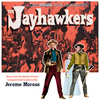Soundtrack Information

The Cardinal: The Classic Film Scores of Jerome Moross
Silva America (SILKD 6030)
Release Date: 2001
Conducted by Paul Bateman
Performed by
The City of Prague Philharmonic Orchestra
Format: CD
Music From
Music By
Purchase Soundtrack
Track Listing
Related Albums
Review: Cardina : The Classic Film Scores of Jerome Moross, The
4 / 5 Stars
At long last, a compilation has come along to address a major injustice in the world of film score recordings. Jerome Moross is often overlooked when classic film scores are discussed, having only written a handful. However, each score is imbued with quality and craftsmanship, as evidenced on this new recording from the busy Silva Screen Records. The City of Prague Philharmonic perform music from six scores, dating from 1948 to 1963.
Moross' writing heard on this two disc set is shot through with a strong feeling of Americana, which can be found in his harmonic, rhythmic and thematic elements. He was more comfortable in the concert world, but film fans were fortunate in that he saw fit to work in Hollywood from time to time. Fans of the American flavored scores (both Westerns and otherwise) of composers like Elmer Bernstein and John Williams would do well to hear this set, since it is more than likely these composers were also exposed to the "Moross sound". One could think of Moross' scores as the American counterpart to Erich Korngold's music, since in both composers work, one could almost add lyrics at any given moment.
The first disc opens with the buoyant rhythms of The Jayhawkers. The opening theme is all brassy and brazen Western scoring, with a wonderful horn theme backed by swirling winds and strings, before settling into a reflective theme for Cam with held string chords below wind and muted brass scoring. This moves into a thick chord-heavy string passage that has just a tinge of Gershwin, and shows off what a terrific orchestrator Moross was. "The Lynching" brings back and develops the opening brassy music further, before erupting into a large-scale fanfare. The final piece of the suite "Attack on Abilene / Death of Darcy / Finale" is more apprehensive than the prior cues, yet again the clarity of Moross' writing for muted brass and winds is stunning. The suite ends with a grand resolution in the brass.
Seven Wonders of the World is represented with two cues, split up by another suite on this disc. A vaguely religioso theme for strings makes up the first part "The Holy Land", in which the composer incorporates the Israeli dance "The Hora" along with other Hebraic coloring. "The Mediterranean" is a pleasant sea-faring melody, with swaying strings and winds against horns. Moross' first film score, Close Up, is heard in a nine-minute suite that opens with a piano and string melody that could easily be transformed into a Broadway melody. The rest of the suite looks forward to colleague Bernard Herrmann's odd metered-espionage score for North By Northwest. It may be telling that Herrmann and Moross were good friends growing up! The suite is consistently exciting and rather advanced for 1948, not to mention being the composer's first score.
Disc one closes out with seven minutes from The Captive City, a docudrama dealing with organized crime. The opening fanfare briefly recalls Max Steiner, before a lyrical theme for strings and trumpets that is again not too far removed from the Broadway stage. The remainder is based around this theme, with some exciting "chase" scoring and a lovely "bluesy" theme for trombones and winds, yet the focus on melody is never lost.
Disc two opens with over eighteen minutes from The Proud Rebel, a Western from 1958. The suite opens with a march, all blistering cymbals, brass and winds, before a sumptuous melody for strings. "The Wagon Ride/The Dress" continues the streak of Americana heard in almost every track. "Fight in the Alley" is a balletic moment of orchestral violence, while "The Farm" features plaintive scoring for oboe, flute, and trumpet. The final cue consists of a galloping section for orchestra, before more pastoral scoring moves into a rhythmic piece covering the denouement of the film. The main theme is warmly reprised in strings and horns for the finale.
The set wraps up with 23 minutes from 1963's The Cardinal, another sprawling Otto Preminger epic. Much of the suite consists of "source" cues (scherzo, quickstep, waltz), contrasted with more somber themes. The prologue opens with the surging low strings and bells of the Cardinal's theme, and although this film is set in Rome, a sense of Americana is still felt in Moross' rich orchestrations. A Bach-like section for brass and strings closes out the prologue. The above "source" cues are airy and never overbearing, never failing to impress with their energy. The tenor of the score is refined, but with the inclusion of the dance cues, is never heavy handed and makes for a wonderful listen.
Silva continues to impress, with thoughtful liner notes by James Fitzpatrick, great packaging based around the art of Saul Bass, and clear, full Dolby Surround Sound. Brass is rich and full, the woodwinds are beautifully displayed, and the bass is never overbearing. The performance of the Prague musicians continues to improve, and these musicians handle this distinctly American material perfectly. The only caveat is that Silva could have added some material from their recording of The Big Country to enhance the playing time a bit more. They are to be applauded for not editing the 84 minutes of music here onto one disc. Fans looking for an album with wonderful playing and terrific melodies will be greatly rewarded with this recording.
-
Click stars
to rate.
If any information appears to be missing from this page, contact us and let us know!


